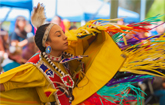Panelists at W.K. Kellogg Foundation Grantee Conference Cite Organized Efforts to Suppress Voters and Success Story for Native Americans in New Mexico
NEW ORLEANS, May 2, 2012 /PRNewswire-USNewswire/ -- A panel of election experts at the W.K. Kellogg Foundation's grantee conference for America Healing outlined the most significant organized efforts to suppress voting rights for Latinos and African Americans over the last 100 years. At the same time, Native Americans have enjoyed a civic engagement success story in New Mexico.
In the last two years, the nation has seen "the most wide-scale, most significant attacks on voting rights that we have seen in a century," said Judy Browne-Dianis, co-director of the Advancement Project. She said the actions were a direct response to the higher turnout rates of African Americans, Latinos and students than in the historic presidential election four years ago.
Browne-Dianis said the American Legislative Exchange Council helped initiate many of the restrictive voter ID proposals in 34 states across the country. The proposals would require unexpired, state-issued photo identification with a current address and signature.
Currently voters must show photo IDs at polling places in Georgia, Indiana, Kansas, Mississippi, Pennsylvania, Tennessee and Wisconsin. In South Carolina and Texas, strict photo ID laws have been approved, but under the Voting Rights Act these states must receive approval from the Justice Department for the new laws to be enacted. Without that approval, these states will require only non-photo ID.
"The Brennan Center did a report that showed that actually 21 million Americans do not have state-issued photo identification; 25 percent of African Americans do not have state-issued photo identification," said Browne-Dianis, adding that tougher restrictions have also been placed on voter registration in some states.
During the panel discussion, Genaro Lopez-Rendon, director of the Southwest Worker's Union, cited election issues related to Latinos in Texas, while Alvin Warren, principal and executive vice president of Blue Stone Strategy Group, discussed the success of Native Americans in overcoming historic voter suppression efforts in New Mexico.
Maya Wiley, president and executive director of the Center for Social Inclusion and the moderator for the panel, noted the need for citizens to become engaged in defending their right to vote. "Because the more they're engaged in being able to govern, the more they're engaged also in fighting," she said, noting that the restrictive laws "keep them from being engaged."
In the discussion, Warren noted that Native Americans can have significant voting clout in New Mexico, which is an important swing state in presidential elections. The Native American population has increased from 134,000 in 1990 to almost 220,000, approximately 11 percent of the state's population.
"In New Mexico, we actually have had very similar experiences to the South when it comes to discriminative, active and intentional, systemic and institutional, with regard to native voting," Warren said. "…. since 1975, several New Mexico counties that have been under federal monitoring for voting rights violations…. I'm proud to tell you, though, that after all of that, we are in this incredible period of resurgence, of native people regaining our voice and our vote. We have 65,000 registered Native American voters in the state, which I think is going to go up, probably to 70,000 to 75,000. We have 11 counties that have a significant native presence, 91 precincts."
Warren maintained that by organizing early, Native Americans benefited from redistricting and organizations are using technology to increase civic participation among the tribes. He said there are 17 Native Americans running for office, their coalitions defeated three voter ID proposals and the state has three state Senate districts and six House districts with a majority of Native American voters and seven additional districts that have a significant percentage. There are only two Native American senators and three representatives, but he said those numbers will increase as civic engagement increases.
"I would say the majority of tribes now are actively involved in doing some kind of voter registration," he said. "They're in their communities doing voter education. My community, I'm proud to say, we've been actively doing this for the last, oh, five or six cycles."
But in Texas, Lopez-Rendon said there are 600,000 people who have voted previously but may not be able to vote this year if the Justice Department allows the state to enact its photo ID law. Among those unable to vote would be his grandmother.
"Hundreds of thousands of registered voters already and hundreds of thousands of potentially registered voters in Texas" would be impacted, he said. "So I mentioned my grandma. And my grandma is now 90 years old. She votes in every election. She has not had an ID for the last 20 years…. So my grandma's going to be one of these 600,000 people that will not be able to vote if this type of proposal goes through."
The grantee meeting in New Orleans this week was part of WKKF's America Healing work that provides grants for organizations to promote racial healing and racial equity to improve the lives of vulnerable children in communities.
For more information about America Healing, visit www.AmericaHealing.org.
***W.K. Kellogg Foundation
The W.K. Kellogg Foundation (WKKF), founded in 1930 as an independent, private foundation by breakfast cereal pioneer, Will Keith Kellogg, is among the largest philanthropic foundations in the United States. Guided by the belief that all children should have an equal opportunity to thrive, WKKF works with communities to create the conditions where vulnerable children can realize their full potential in school, work and life.
The Kellogg Foundation is based in Battle Creek, Mich., and works throughout the United States and internationally, as well as with sovereign tribes. Special emphasis is paid to priority places where there are high concentrations of poverty and where children face significant barriers to success. WKKF priority places in the U.S. are in Michigan, Mississippi, New Mexico and New Orleans; and internationally, are in Mexico and Haiti. For more information, visit www.wkkf.org.
New Orleans was chosen as the site of this second annual grantee meeting because the foundation considers New Orleans a priority place for investments and several grantees in the city were involved in the conference. For more information, visit www.wkkf.org.
SOURCE W.K. Kellogg Foundation
WANT YOUR COMPANY'S NEWS FEATURED ON PRNEWSWIRE.COM?
Newsrooms &
Influencers
Digital Media
Outlets
Journalists
Opted In





Share this article